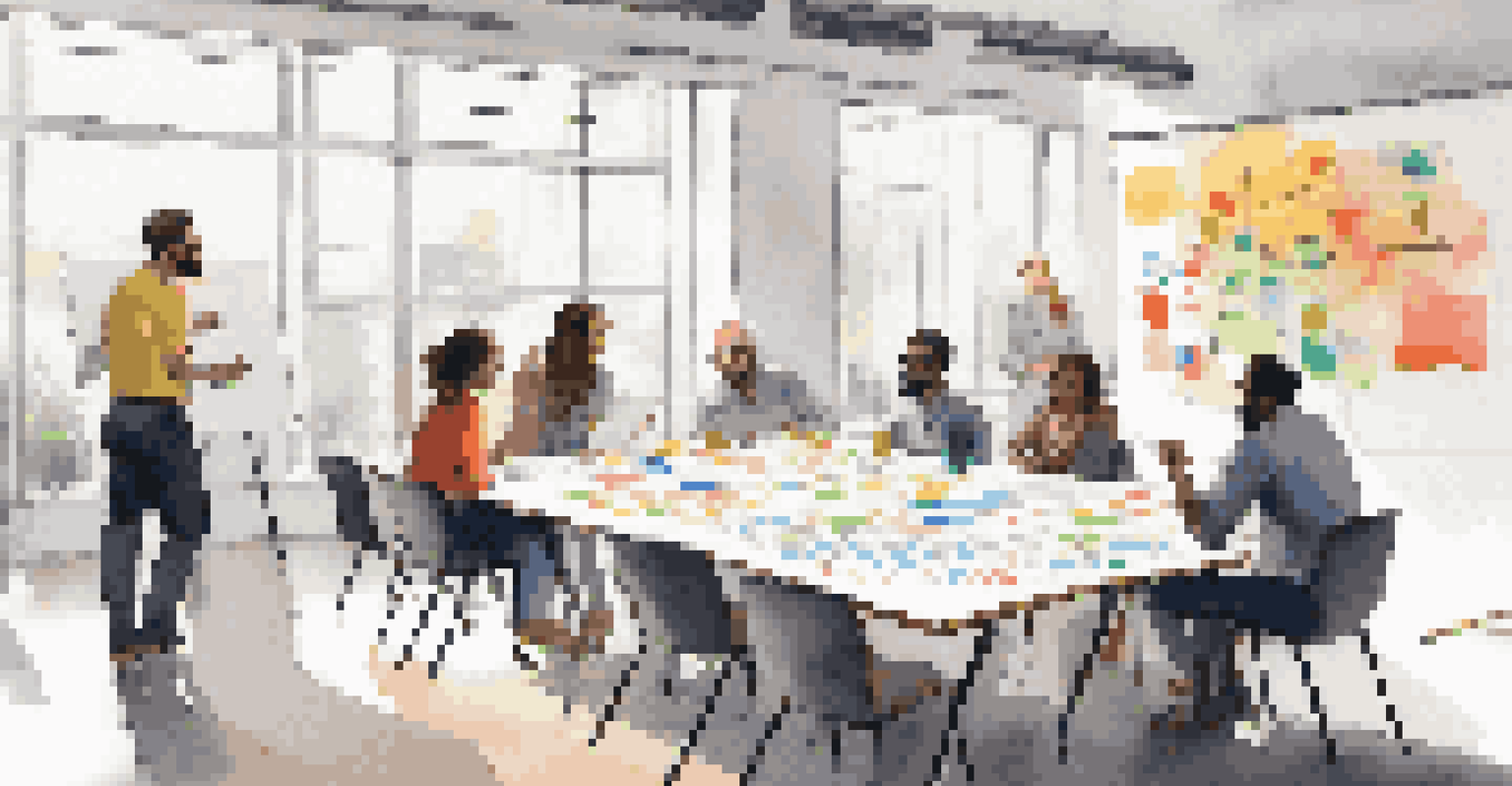The Future of Work: Digital Skills Needed for 2025 and Beyond

Understanding the Shift in the Work Environment
As we move toward 2025, the workplace is evolving at an unprecedented pace. Remote work, automation, and digital collaboration tools are reshaping how we operate daily. This shift demands a new approach to work, one that emphasizes adaptability and continuous learning.
The future belongs to those who prepare for it today.
In this changing landscape, traditional skills may no longer suffice. Companies are increasingly looking for employees who can navigate digital platforms, analyze data, and communicate effectively in virtual environments. It's essential to recognize that these skills will be crucial for job security and career growth.
Ultimately, embracing this transformation means being proactive about acquiring new digital competencies. Those who invest in learning will not only stay relevant but also thrive in an increasingly competitive job market.
The Rise of Data Literacy in Every Role
Data literacy is becoming a cornerstone of the modern workplace. It's no longer just for data analysts; every team member should understand how to interpret and utilize data effectively. This skill allows employees to make informed decisions and drive strategic initiatives.

For instance, marketers need to analyze customer behavior data to create targeted campaigns, while sales teams must interpret trends to identify new opportunities. By fostering a culture of data literacy, organizations can enhance collaboration and innovation across departments.
Adaptability is Key to Success
Embracing adaptability allows employees to thrive in a rapidly changing work environment.
To prepare for the future, individuals should seek training in data analysis tools and techniques. Understanding how to work with data enhances problem-solving capabilities and empowers employees to contribute meaningfully to their organizations.
Embracing Technology: Tools for Collaboration
In the future of work, technology will play a pivotal role in how teams collaborate. Tools like project management software, video conferencing, and instant messaging have already transformed communication. Mastering these technologies will be essential for seamless collaboration.
In a world where change is constant, the ability to adapt is your greatest asset.
Imagine a team spread across different continents, working together on a project in real time. With the right tools, members can share ideas, track progress, and provide feedback instantly, regardless of their location. This level of connectivity fosters creativity and speeds up project timelines.
As we approach 2025, investing time in learning these collaborative tools will be crucial. Those who embrace technology will enhance their productivity and become invaluable assets to their teams.
Creative Problem-Solving: A Key Skill for Innovation
Creative problem-solving is increasingly recognized as a vital skill in the digital age. The ability to think outside the box and develop innovative solutions can set individuals apart in a crowded job market. This skill will be essential for addressing complex challenges that arise in the workplace.
For example, consider a software development team facing a critical deadline. A creative thinker might suggest a new approach to streamline the coding process, ultimately saving time and resources. Such innovative insights can significantly impact project outcomes and overall productivity.
Data Literacy for All Roles
Every team member must develop data literacy to make informed decisions and drive strategic initiatives.
To cultivate this skill, individuals should engage in activities that encourage creativity, such as brainstorming sessions and design thinking workshops. By nurturing their creative abilities, employees can contribute to a culture of innovation within their organizations.
The Importance of Emotional Intelligence in Teams
As workplaces become more digital, emotional intelligence (EI) is emerging as a crucial skill set. EI involves recognizing and managing one’s emotions and understanding the emotions of others. This ability fosters better teamwork and communication, especially in virtual settings.
For instance, leaders with high emotional intelligence can effectively motivate their teams, even when working remotely. They can read the emotional cues of their team members and adjust their communication style accordingly, leading to a more cohesive work environment.
To enhance emotional intelligence, individuals should practice active listening, empathy, and self-awareness. By developing these skills, employees can strengthen relationships and improve collaboration, making them more effective in their roles.
Adaptability: Navigating the Future Workplace
Adaptability is perhaps one of the most critical skills for the future of work. With rapid technological advancements and shifting job roles, being able to pivot quickly and embrace change will be essential. Employees who can adapt will not only survive but thrive in dynamic environments.
Think of adaptability as a muscle that needs regular exercise. The more you expose yourself to new experiences, challenges, and changes, the stronger this skill becomes. This mindset will enable you to tackle unexpected situations with confidence and resilience.
Continuous Learning is Essential
A commitment to continuous learning equips individuals with the skills needed for career advancement in an evolving job market.
To build adaptability, seek out opportunities to learn new skills, take on diverse projects, and embrace feedback. By fostering a flexible mindset, you can navigate the complexities of the future workplace with ease.
Continuous Learning: A Lifelong Commitment
In an ever-changing work landscape, continuous learning is not just beneficial; it's essential. The pace of technological change means that new skills will continually emerge, and staying updated is crucial for career advancement. Individuals must cultivate a growth mindset that embraces lifelong learning.
Consider the example of a marketing professional who regularly attends workshops to learn about new digital marketing trends. By staying informed, they can implement fresh strategies that give their company a competitive edge. This commitment to learning can make a significant difference in professional development.

To foster continuous learning, individuals should set aside time for self-improvement, whether through online courses, webinars, or reading industry-related articles. By prioritizing education, you can ensure that you remain adaptable and equipped for the challenges ahead.
Conclusion: Preparing for the Future of Work
As we look ahead to 2025 and beyond, it's clear that the workplace will continue to evolve. Embracing digital skills such as data literacy, adaptability, and emotional intelligence will be crucial for success. By prioritizing these competencies, individuals can position themselves for a bright future in their careers.
Moreover, organizations that invest in employee training and development will benefit from increased innovation and productivity. By fostering a culture of continuous learning and adaptability, companies can navigate the changing landscape more effectively.
Ultimately, the future of work will belong to those who are proactive about acquiring new skills. By preparing now, we can embrace the opportunities that lie ahead and shape a successful future together.